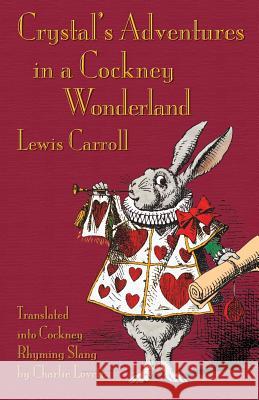Crystal's Adventures in a Cockney Wonderland: Alice's Adventures in Wonderland in Cockney Rhyming Slang » książka
Crystal's Adventures in a Cockney Wonderland: Alice's Adventures in Wonderland in Cockney Rhyming Slang
ISBN-13: 9781782011156 / Angielski / Miękka / 2015 / 168 str.
Crystal's Adventures in a Cockney Wonderland: Alice's Adventures in Wonderland in Cockney Rhyming Slang
ISBN-13: 9781782011156 / Angielski / Miękka / 2015 / 168 str.
(netto: 65,56 VAT: 5%)
Najniższa cena z 30 dni: 67,90
ok. 16-18 dni roboczych.
Darmowa dostawa!
Cockney Rhyming Slang, as anyone who has stood at the till in a London souvenir shop could tell you, is a set of slang expressions based on taking the original word (say, "stairs") and rhyming it with the final word of a short phrase ("apples and pears"), and then, in some cases, shortening the new expression ("apples"). This can lead to a sentence such as: "Careful you don't slip and fall down the apples." While the slang is often cited as the "secret language" of the Cockney population of London, many of its expression have entered into general usage, not just in the UK, but throughout the English-speaking world. This is not a translation of "Alice's Adventures in Wonderland" in the purest sense. It is, rather, the result of a linguistic game-another sort of translation. What Charles Dodgson would have loved most about Cockney Rhyming Slang, and what makes it suited for application to "Alice," is that it is, as John Ayto writes in his introduction to "The Oxford Dictionary of Rhyming Slang," "all really part of a giant ongoing word game, whose product is much more droll artefact that linguists' lexeme." It is with this idea of Cockney Rhyming Slang as word game, and with the goal of creating "droll artefact," that this translation has been approached.
Cockney Rhyming Slang, as anyone who has stood at the till in a London souvenir shop could tell you, is a set of slang expressions based on taking the original word (say, "stairs") and rhyming it with the final word of a short phrase ("apples and pears"), and then, in some cases, shortening the new expression ("apples"). This can lead to a sentence such as: "Careful you don't slip and fall down the apples". While the slang is often cited as the "secret language" of the Cockney population of London, many of its expression have entered into general usage, not just in the UK, but throughout the English-speaking world. This is not a translation of "Alice's Adventures in Wonderland" in the purest sense. It is, rather, the result of a linguistic game-another sort of translation. What Charles Dodgson would have loved most about Cockney Rhyming Slang, and what makes it suited for application to "Alice", is that it is, as John Ayto writes in his introduction to "The Oxford Dictionary of Rhyming Slang", "all really part of a giant ongoing word game, whose product is much more droll artefact that linguists' lexeme". It is with this idea of Cockney Rhyming Slang as word game, and with the goal of creating "droll artefact", that this translation has been approached.











